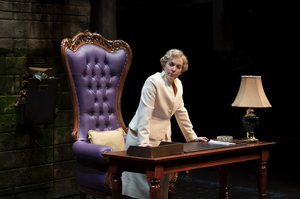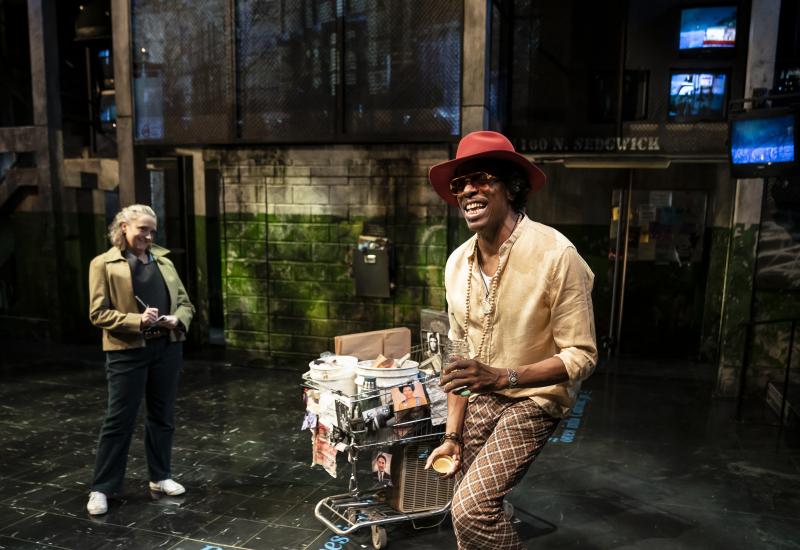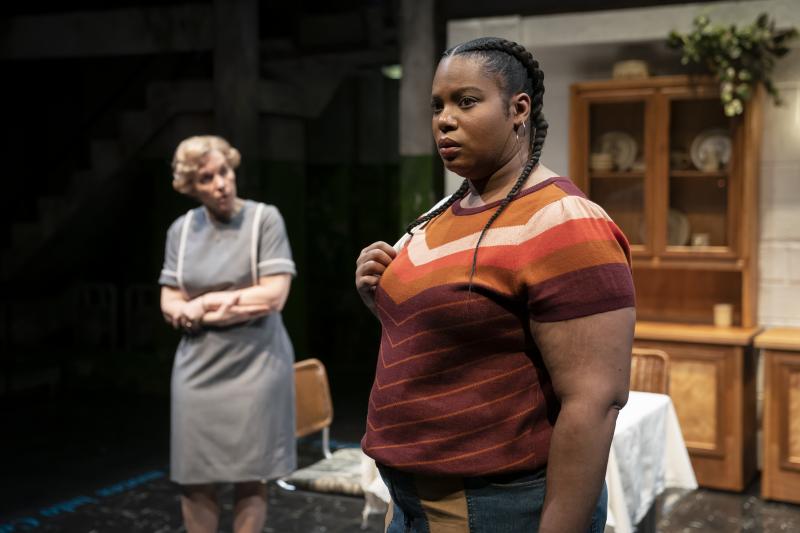Review: HER HONOR JANE BYRNE at Lookingglass Theatre

J. Nicole Brooks's HER HONOR JANE BYRNE, now in a world premiere production at Lookingglass, is a play deeply rooted in Chicago's not-too-distant history. Inspired by former Chicago Mayor Jane Byrne (the first woman to serve as mayor here) and her decision to move into Cabrini-Green as a display of her desire to revitalize the city's housing projects, the play introduces a cast of characters representing different perspectives in the city. Brooks (who also directs) has assembled an intriguing array of characters in HER HONOR JANE BYRNE, and she makes the pivotal choice to prominently feature residents of Cabrini-Green as much as Byrne and some of her fellow Chicago politicians. Yet the play becomes too cluttered in its various storylines and ideas.
HER HONOR JANE BYRNE is a fascinating idea for a play and particularly one to be  staged at a Chicago theater, but Brooks draws on perhaps too many presentational styles and characters in execution. The play vacillates between scenes grounded in realistic dialogue to some extended character monologues (which are compelling, just quite different from the former), and some experimental scenes that seem to exist in their own world. Yu Shibagaki's set design also lives in a transitional space. The set design succeeds in creating a detailed representation of Cabrini-Green, and it also incorporates a number of television screens that are clearly prime 1980s technology. The set also features projections from Rasean Davonte Johnson, including supertitles presented before certain scenes. As with the various presentational styles in the play, I wasn't sure that all the supertitles were necessarily justified by their corresponding scenes.
staged at a Chicago theater, but Brooks draws on perhaps too many presentational styles and characters in execution. The play vacillates between scenes grounded in realistic dialogue to some extended character monologues (which are compelling, just quite different from the former), and some experimental scenes that seem to exist in their own world. Yu Shibagaki's set design also lives in a transitional space. The set design succeeds in creating a detailed representation of Cabrini-Green, and it also incorporates a number of television screens that are clearly prime 1980s technology. The set also features projections from Rasean Davonte Johnson, including supertitles presented before certain scenes. As with the various presentational styles in the play, I wasn't sure that all the supertitles were necessarily justified by their corresponding scenes.
Still, HER HONOR JANE BYRNE at its center does open up some key questions about Mayor Jane Byrne's decision: Was it just a publicity stunt, or was it really born out of empathy and a desire to create change? What did it mean that Chicago's first female mayor made this decision? And what do we do when our empathy is real, but it might not be fully complete or enough to truly help others?
In her portrayal of Mayor Byrne, Christine Mary Dunford beautifully conveys these paradoxes. Dunford presents Mayor Byrne as a strong woman with a tough exterior, who knows she must stand firm when communicating with the city's male politicians (here primarily represented by Thomas J. Cox as Alderman Roti, the quintessential Windy City politician). Yet Dunford also plays Mayor Byrne's more introspective moments with integrity as well, even as it becomes clear that Byrne herself may not fully understand the ramifications of her actions.
The ensemble members that play alongside Dunford are equally compelling, though I  wish Brooks had devoted more script time to some of these fascinating characters.In order to do so, though, she likely would have had to reduce the number of players. Robert Cornelius and Tracy Walsh have one of the most delightful rapports as Cabrini-Green resident Black Che and a reporter who hopes to uncover more insights into the area's crimes. Cornelius and Walsh engage in some fantastic verbal sparring, though their characters do not see much of a resolution in the play. Similarly compelling, however, is Nicole Michelle Haskins as Tiger, a teenage resident of Cabrini who isn't afraid to voice her concerns to the Mayor. Haskins plays Tiger with punch and ferocity, and she commands the stage with ease.
wish Brooks had devoted more script time to some of these fascinating characters.In order to do so, though, she likely would have had to reduce the number of players. Robert Cornelius and Tracy Walsh have one of the most delightful rapports as Cabrini-Green resident Black Che and a reporter who hopes to uncover more insights into the area's crimes. Cornelius and Walsh engage in some fantastic verbal sparring, though their characters do not see much of a resolution in the play. Similarly compelling, however, is Nicole Michelle Haskins as Tiger, a teenage resident of Cabrini who isn't afraid to voice her concerns to the Mayor. Haskins plays Tiger with punch and ferocity, and she commands the stage with ease.
HER HONOR JANE BYRNE brings a fascinating moment in Chicago's history to life and exposes many of the cracks when it comes to racial inequality and flaws in the city's political system. But it's a play full of so many ideas, and I think it could use some further honing. This is a compelling story, no doubt, but I think there's yet more room to go further below the surface on some of the points that Brooks makes here.
As of this writing, HER HONOR JANE BYRNE is scheduled to play at Lookingglass Theatre, 821 North Michigan Avenue, through April 12. Tickets are $45-$85. Visit lookingglasstheatre.org for more information.
Photo Credit: Liz Lauren
Reader Reviews

Videos

